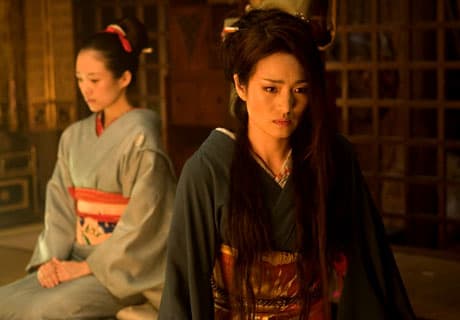Arthur Golden's controversial 1997 bestseller was a beautifully introspective, though harshly berated for its inaccuracies, Cinderella tale about a young Japanese girl's rise to the top of the geisha chain that calmly waited for its big screen adaptation.
Like the book, Rob Marshall's film has created its own controversy simply with the casting of somewhat recognisable Asian actors, most of whom are not Japanese. His solution to this problem was easy: an English script, which in turn caused another problem for many film buffs. Memoirs of a Geisha was never going to be a nice piece of traditional Asian cinema complete with subtitles for Westerners. Not only was the novel written in English by an author from Chattanooga, TN, but the executive producer is one Steven Spielberg, who at one time was looking to direct.
For any filmgoer looking to see Marshall's follow-up to the Oscar-hogging Chicago, or any apathetic fan of the novel who couldn't care less about the filmmaking politics behind the film, Geisha is a triumphant work of art. Accordingly, lead character Sayuri is portrayed by three different actresses primarily by adult beauty Zhang Ziyi. Marshall has kept the modern day narration by the character in her old age as a storytelling device, however, it doesn't completely work since the entirety of the novel isn't included; it's mainly about what happens to our heroine after she reaches her happy state.
Despite this minor flaw, which was most likely omitted for time, the film works exactly how it should. The accents may take a little getting used to, but they succeed in the end and avoid both a cheesy and unflattering effect, while the story unfolds without any head-scratching or gasping errors. Where the film finds its allure though is in the authentic sets and costume, and the magical score by Yo-Yo Ma, which is the film's secret weapon. All three of these aspects interact for the film's breathtaking dance sequence where Sayuri performs in front of bidders looking to buy her virginity. Marshall's combination of vivid colours and lighting are even more brilliant and effective than the ones that earned him an Oscar nod for Best Director, this time with results that are enough to bring you to tears of joy.
There's no denying this is a real Hollywood film out to reach the masses, and if you're smart enough to ignore the hypersensitive pessimists out there, Geisha is as thoroughly enjoyable, if not more so, as Golden's novel. (Sony)
Like the book, Rob Marshall's film has created its own controversy simply with the casting of somewhat recognisable Asian actors, most of whom are not Japanese. His solution to this problem was easy: an English script, which in turn caused another problem for many film buffs. Memoirs of a Geisha was never going to be a nice piece of traditional Asian cinema complete with subtitles for Westerners. Not only was the novel written in English by an author from Chattanooga, TN, but the executive producer is one Steven Spielberg, who at one time was looking to direct.
For any filmgoer looking to see Marshall's follow-up to the Oscar-hogging Chicago, or any apathetic fan of the novel who couldn't care less about the filmmaking politics behind the film, Geisha is a triumphant work of art. Accordingly, lead character Sayuri is portrayed by three different actresses primarily by adult beauty Zhang Ziyi. Marshall has kept the modern day narration by the character in her old age as a storytelling device, however, it doesn't completely work since the entirety of the novel isn't included; it's mainly about what happens to our heroine after she reaches her happy state.
Despite this minor flaw, which was most likely omitted for time, the film works exactly how it should. The accents may take a little getting used to, but they succeed in the end and avoid both a cheesy and unflattering effect, while the story unfolds without any head-scratching or gasping errors. Where the film finds its allure though is in the authentic sets and costume, and the magical score by Yo-Yo Ma, which is the film's secret weapon. All three of these aspects interact for the film's breathtaking dance sequence where Sayuri performs in front of bidders looking to buy her virginity. Marshall's combination of vivid colours and lighting are even more brilliant and effective than the ones that earned him an Oscar nod for Best Director, this time with results that are enough to bring you to tears of joy.
There's no denying this is a real Hollywood film out to reach the masses, and if you're smart enough to ignore the hypersensitive pessimists out there, Geisha is as thoroughly enjoyable, if not more so, as Golden's novel. (Sony)
